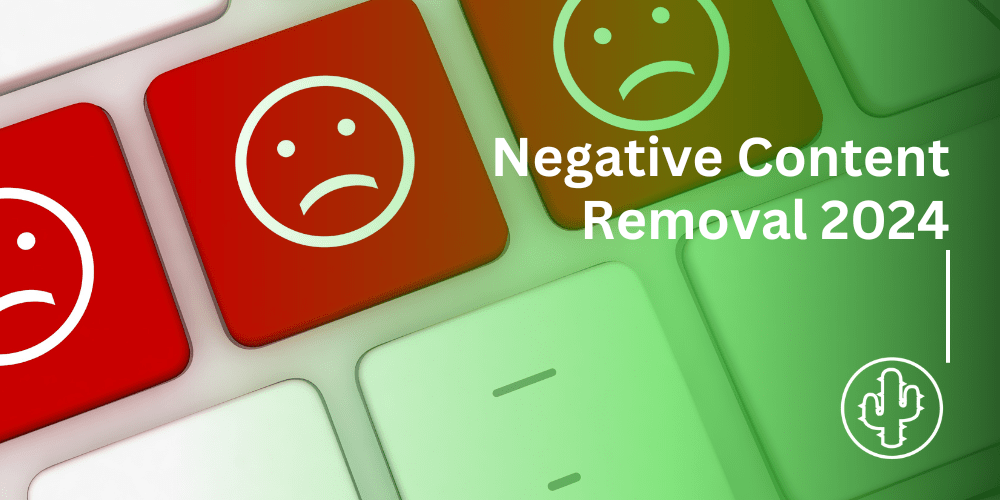In an increasingly digital world, an excellent online reputation attracts customers to a business and makes prospective employees more likely to join a company. It can also influence people’s personal and social lives.
Negative online content can damage brand image and cause legal issues (even if you’ve done nothing wrong, defamatory statements can result in lawsuits). It can also cause a downgrade in search rankings, difficulty attracting customers, increased competition, loss of business, loss of consumer trust, and loss of revenue.
Forbes has indicated that a single negative result on Google’s first page results in a 22% loss of revenue. Two negatives double this to 44%, and three negatives can cause a whopping 59% loss of income.
Here’s how to use online reputation management tactics to remove negative content about you or your brand from the internet.
What Not To Do
Removing harmful content from the web using online reputation management (ORM) can do wonders for your brand. Before we get into these ways of dealing with negative information, we want to provide a couple of cautions.
First, no matter how much you may be tempted to employ someone to hack the site with negative content, don’t do it. It will cost you a lot to employ the hacker, they will almost certainly fail in removing the information, and the site owner will see which page they tried to hack. One company that tried this ended up with the hacked site owner publishing a far worse post about them than the first one.
We also suggest that you stay away from defamation lawyers. Their services are expensive, but that’s not the worst part. Their cease-and-desist letters often end up being posted online, drawing more attention to the harmful content and further damaging your reputation.
What Should You Do?
Begin ORM by evaluating your current reputation. Examine whether your brand’s first impression (search engine result) is positive and gauge the empathy of your response to customers who have had a bad experience. See what users say about your business on various review sites.
Then employ one of two strategies: either try removing negative content from the internet or suppressing it.
Removing content may mean getting it taken down or de-indexed on the site that published it (which is often fruitless). You can also ask search engines (especially Google) to stop indexing the page due to violations of policy, which sometimes goes through but is usually unsuccessful.
Suppressing negative content—the most profitable ORM strategy for such situations—bumps it down the search engine results pages (SERPs) to the second or third page, where it’s practically invisible.
We recommend using Google Alerts to notify you of harmful content published online about your brand (or yourself).
Getting Content Taken Down by Web Admins
If you own a site or profile yourself, you can remove the posts, images, and comments that paint you in a bad light. Other times, it’s publicly hosted, so you cannot remove it yourself.
If the content is against the law or violates Google policies, you can get it taken down or de-indexed. However, this is only sometimes possible due to free speech rights and needs to be navigated cautiously so you do not attract more bad press.
Take screenshots if you want the webmaster or page owner to remove negative content from their site. Should it become necessary to take legal action, these will be valuable records to boost your case.
Should a web admin not wish to remove unflattering content (or cannot take it down), you can request that they add a no-index tag. Although people with the direct URL for that page will still be able to reach it, but it will no longer appear in search engine results.
Outright removal is rare, as clicks and engagement monetize most sites. If you can show evidence from court cases that discredit information in the original article, you are more likely to get action from the web admin.
Getting Content Taken Down or De-Indexed by Google

Google’s content policies state that they will remove fake, off-topic, and obscene content. They will also remove sensitive personal information such as identification numbers or financial details, sexually explicit content you have not consented to post, and hate speech.
They further undertake to remove content impersonating your persona (including deep fakes), content that violates intellectual property laws, and doxing.
Doxing is the term used for releasing confidential internal documents to the public by hackers.
Google has a DMCA form where you can ask them to remove content for violating intellectual property law (such as copyright or trademark). Remember that you must make a compelling case for Google to take action.
Dealing with Reviews
Negative reviews provide a golden opportunity for businesses to respond empathetically and attentively. Doing so helps build a following of loyal customers who advocate for your brand without you even asking them to help you.
Fake reviews hurt brands’ online reputations. Eliminate any positive fake reviews from your site, as these diminish your brand image. If they are on third-party sites, review those sites’ terms of use, and report the fake review to the platform.
Learn to spot fake negative reviews by looking for red flags such as the poster not being in your customer database and a large number of negative reviews being posted quickly.
Links between the poster and your competitor, mention of a competitor, and lack of customer service call records are also red flags.
Suppressing Negative Content with Reverse SEO
The overwhelming majority of Google users only go to the first page of the SERPs; in fact, only around one in a hundred people click through to the 11th result (at the top of the second page).
By using so-called “reverse SEO,” one can suppress negative results. This process involves finding or creating positive content about you or your brand and boosting it in the SERPs, thus pushing the harmful content down.
If you push it to the third page of the Google results, it’s almost as good as removing it from the internet entirely.
How Do You Suppress Negative Content?
Identify search phrases that result in negative content appearing in the results and see whether there is favorable content ranking below these results. Work on optimizing these positive results to rank higher (above the ones you want to suppress). You will also have to create new content that shows you and your brand in a good light and optimize it, so it ranks highly.
However, note that ORM nowadays requires more than making lots of positive and optimized content to suppress negative content. To promote the results you want to rank higher, you will also have to invest in SEM (search engine marketing), which means you will pay to promote this content.
Don’t give up hope, though. Regularly updating your website and publishing new content on it and social sites, plus engaging with your followers on social media, all help to boost the perceived quality of your content, resulting in search engines elevating it on the results pages.
Track the progress of your promotion and suppression efforts, and see what is working and what isn’t.
ORM Tips for Ranking on Google Search Results
See whether you can register a domain name with desirable keywords (so-called Exact Match Domains), as these generally rank exceptionally well in Google search results.
Contribute to third-party sites with high domain authority, such as writing long-form blog posts on Medium, Substack, Typepad, the New Yorker, or the Atlantic. Their high authority means they rank well.
Over time, as you continue contributing to these sites, you rank highly for your desired keywords. You also establish yourself or your brand as thought leaders in a particular field. Such contributions are a potent form of ORM.
Creating backlinks to boost the authority of these pages helps them rank higher. You can do this by linking to social media profiles, linking between social profiles, linking to other blogs, and so forth.
Optimize an article for the featured snippet. This tactic is powerful, as featured snippets rank first on page one, which can propel your page up the rankings to the first spot. Featured snippets are often the first impression people have of a particular incident related to you or your company.
ORM also involves curating your social media presence well. Check your social following, your posting frequency, whether your content reflects your brand, your engagement with comments and DMs, and your response time. Search for industry hashtags, your location, and your brand name, and see whether your fans are sticking up for you.
Why You Should Hire a Reputation Manager

Navigating the complexities of online reputation management can be a daunting task for any individual or business. The digital landscape is vast and ever-changing, making it difficult to monitor and manage every aspect of your online presence. From identifying negative content across various platforms to implementing strategies for its removal or suppression, the challenges are numerous. This is where the expertise of a reputation manager becomes invaluable.
Hiring a reputation manager or engaging with an ORM company allows you to entrust these critical tasks to seasoned professionals who specialize in safeguarding and enhancing online reputations. These experts employ a variety of tools and strategies to monitor the web for any content that could harm your brand’s image. They work diligently to address negative reviews, misleading information, and any adverse content that surfaces, employing tactics that range from direct removal to developing positive content that outweighs the negative, improving your overall digital footprint.
Moreover, a reputation manager can provide strategic advice on building and maintaining a positive online presence, leveraging SEO and content marketing to ensure that what’s found about you or your brand online is favorable. This proactive approach to ORM not only helps in crisis management but also contributes to building a robust online identity that can withstand challenges and capitalize on opportunities.
In essence, hiring a reputation manager frees you to focus on core business activities, knowing that your online reputation is in skilled hands. It’s an investment in your brand’s longevity and success in the digital age, ensuring that your reputation remains strong and positive, now and in the future.

